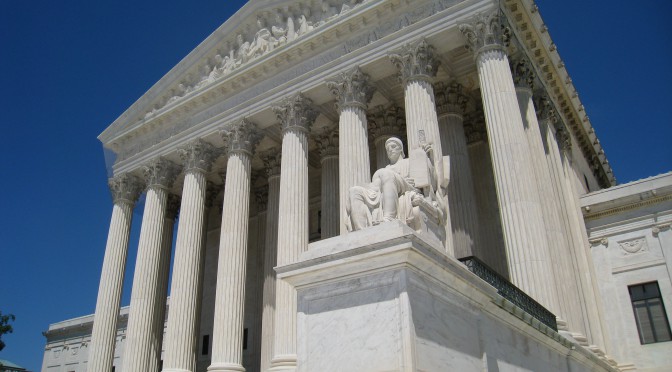Did you miss your Supreme Court news this week? Let our Weekly Roundup help. (To stay on top of the latest Supreme Court happenings, follow ISCOTUS on Twitter.)
The Supreme Court overturned the conviction of a woman for carrying a stun gun to defend against an abusive former partner in Caetano v. Massachusetts. Reporting from Slate and NPR, with a general roundup of March 22nd’s orders from The New York Times.
In Tyson Foods, Inc. v. Bouaphakeo, the Court sided with the workers who sought overtime pay for putting on and taking off protective gear for their “grueling and dangerous” work. Reporting from The National Law Journal, Forbes, The New York Times and AP.
Various news outlets have begun to research President Obama’s Supreme Court nominee Merrick Garland. The New York Times examines Garland’s record and style, while The Hill looks at some of his most intriguing cases. The Washington Post features impressions of Garland from schoolkids he tutors. Politico wrote that Garland has written “few seminal opinions” that encapsulate his legal ideology—and “that may be a good thing.”
Orrin Hatch continues his campaign to defend Senate Republican refusal to hold hearings for any Obama nominee. He writes on Bloomberg View that “[b]y seeking to thrust a confirmation battle into the middle of a particularly bitter presidential election, President Barack Obama carelessly risks further polarizing and politicizing the confirmation process, and further damaging the integrity and public standing of the Supreme Court as an institution.”
For a useful history lesson on the Supreme Court nomination process, check out this piece on Slate. (Short version: It’s political and always has been.)
What has been the impact of the Texas’s abortion regulation that the Court is currently reviewing? The New York Times and Think Progress report.
In this term’s challenge to the Affordable Care Act, the Court heard arguments on Wednesday in Zubik v. Burwell, brought by religious non-profit groups who don’t want to provide access to birth control for female employees and students, as required under the ACA. Writes Dahlia Lithwick on Slate: “In case you believed the court’s conservatives have maybe come around on Obamacare—well, no. They still hate it.” Additional commentary from The Economist and Bill of Health Blog.

